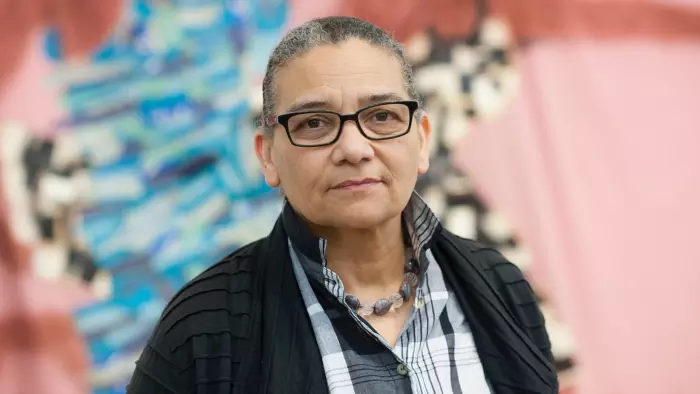Black Women in Arts
Lubaina Himid becomes first black woman to win Turner Prize
Artist triumphs with exuberant work exploring race and gender
Lubaina Himid has won the Turner Prize, the UK’s most important contemporary art prize, for what the jury described as her “expansive and exuberant approach to painting, which combines satire and a sense of theatre”. She is the first black woman to win the prize. Now in her 63rd year, she is also the first artist over the age of 50, following the Turner’s decision to remove the age limit this year. The £25,000 prize was presented by DJ and artist Goldie at a ceremony in Hull broadcast live on the BBC. A further £5,000 was awarded to each of the other shortlisted artists, film-maker Rosalind Nashashibi, multimedia artist Andrea Büttner and painter Hurvin Anderson. Himid’s victory was based on her two solo shows this year at Modern Art Oxford and Spike Island in Bristol, as well as her participation in the group exhibition The Place is Here at Nottingham Contemporary. Alex Farquharson, director of Tate Britain and chair of the Turner jury, spoke of the “huge resonance” the trio of shows possessed for “the current moment”. In particular, he singled out Spike Island’s installation of 100 life-size figures, “each of which had a specific historic identity”, of African slaves put to work in 18th-century European royal courts.

Himid has always made art which speaks to the politics of race and gender, yet her early background as a theatre designer and enormous talent as a painter ensure her work remains, as Farquharson puts it, at a “high pitch of exuberance”. In Hull the display is on show at the Ferens Art Gallery. It is the first time the touring prize has held an edition in the East Yorkshire city, which is UK City of Culture this year. Visitors will encounter Himid’s signature blend of painting, installation, ceramics and found objects woven together into a poetic yet profound meditation on the past and present experience of black and white people in Britain and beyond. Born in Zanzibar in 1954, Himid moved to the UK as a child. After studying theatre design at Wimbledon College of Art and graduating with an MA in cultural history at the Royal College of Art, London, she constructed a multi-disciplinary career as an artist, curator and teacher. Now professor of contemporary art at the University of Central Lancashire, her support of black British artists, including curating landmark show The Thin Black Line at the ICA in 1986, has made her an inspirational role model in the black arts community. Her career was challenged, however, by the discrimination that still affects black artists, particularly women, in the UK. Until this year, Himid’s art was largely unknown to the wider…
Please read original article- Lubaina Himid becomes first black woman to win Turner Prize




























